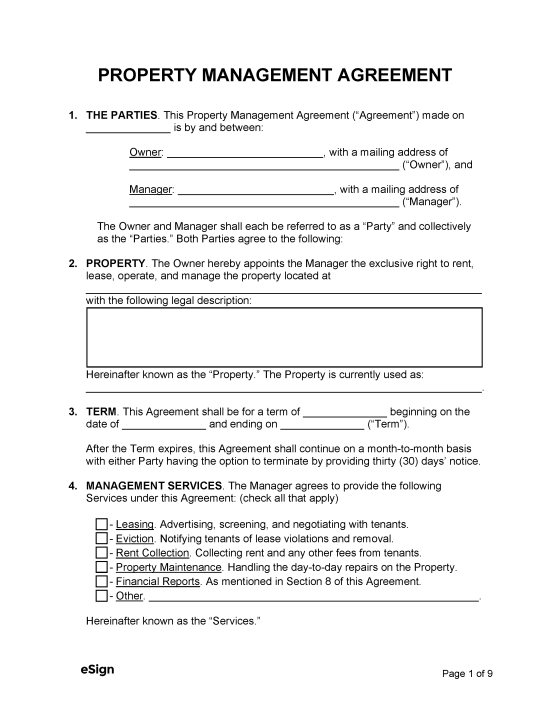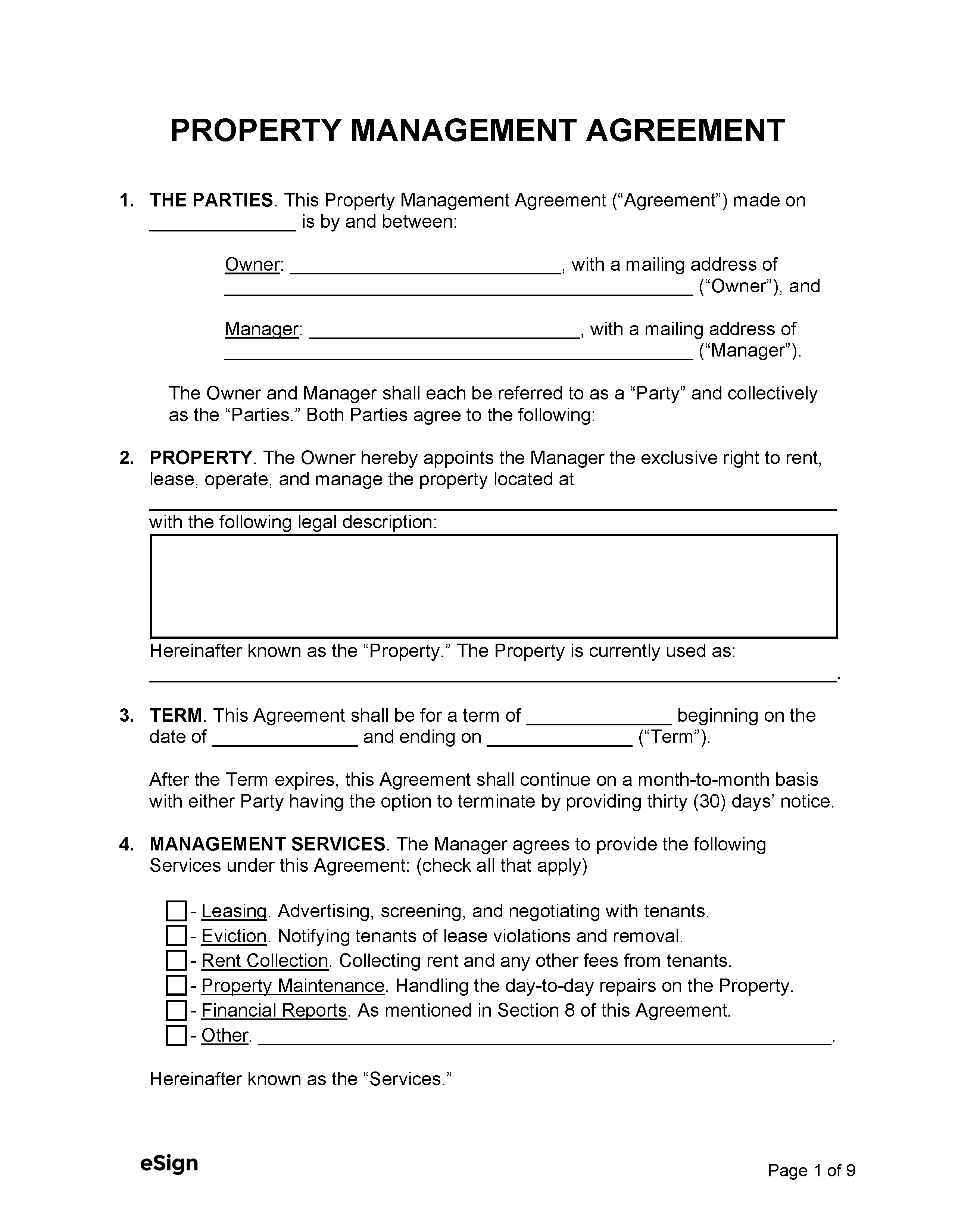Commonly Used For:
- Residential (single-family home, condo, duplex)
- Multi-Family (apartment building)
- Mixed-Use (commercial and residential)
- Commercial (retail, industrial, office)
Contents |
By State
- Alabama
- Alaska
- Arizona
- Arkansas
- California
- Colorado
- Connecticut
- Delaware
- Florida
- Georgia
- Hawaii
- Idaho
- Illinois
- Indiana
- Iowa
- Kansas
- Kentucky
- Louisiana
- Maine
- Maryland
- Massachusetts
- Michigan
- Minnesota
- Mississippi
- Missouri
- Montana
- Nebraska
- Nevada
- New Hampshire
- New Jersey
- New Mexico
- New York
- North Carolina
- North Dakota
- Ohio
- Oklahoma
- Oregon
- Pennsylvania
- Rhode Island
- South Carolina
- South Dakota
- Tennessee
- Texas
- Utah
- Vermont
- Virginia
- Washington
- West Virginia
- Wisconsin
- Wyoming
What Should be Included (9 clauses)
- Appointment of Property Manager
- Term
- Right to Terminate
- Leasing
- Evictions
- Right-to-Sell the Property
- Repairs and Maintenance
- Manager Compensation
- Distributions to Landlord
1. Appointment of Property Manager
Whether the manager is an individual or a company, their name must be included in the contract. If the property manager is an entity, the document should contain any individual names that will have access to the premises.
2. Term
The agreement should include the length of the term as well as the beginning and end dates. The most common term of a property management agreement is 1 year, with an option to extend without notice.
3. Right to Terminate
If one of the parties wishes to end the agreement, they can send a termination letter to the other party expressing their intent as long as the proper notice period is observed. A typical notice period is 30 days.
4. Leasing
The landlord may grant the manager the right to lease the property to tenants, which is a common service that property managers provide. The landlord can control the rent themselves or allow the manager to set the amount based on fair market values.
A lease agreement can be used to enter into a legally binding contract with a tenant in accordance with state law.
5. Evictions
Determining when to evict a tenant and going through the eviction process are tasks often handled by a property manager.
An eviction notice can be used to officially notify a tenant of a lease violation.
6. Right-to-Sell the Property
The property owner has the option to give the manager the right to sell the property on their behalf. In addition to their regular management fees, having the right-to-sell would allow the manager to collect a commission for leasing or selling property.
A listing agreement can be used to create an exclusive relationship between a property owner and a real estate agent.
7. Repairs and Maintenance
Repairs and maintenance are two of the main reasons for hiring a property manager. The manager will be responsible for performing repairs or general maintenance on the property or hiring contractors to complete this work on their behalf.
A notice to enter can be used to inform tenants that the property manager or worker will need to access the premises for repairs/maintenance on the day specified in the letter.
8. Manager Compensation
The manager’s compensation must be provided in the agreement, which may include management fees, new lease fees, lease renewal fees, and other payment options.
Common rates for hiring a management company or independent contractor:
- Single-Family: 10% of rent (Roofstock)
- Multi-Family: 8-12% of rent (Apartment List)
- Commercial: 4-12% of rent (Janover)
- Triple-Net (NNN): 1-3% (BiggerPockets)
Common rates for hiring an employee as a full or part-time manager:
For short-term rentals (e.g., Airbnb, HomeAway, etc.):
A property manager can expect to be paid 20% to 35% of the total rent.
9. Distributions to Landlord
The money made from leases will be paid to the landlord on a regular basis. The payment period is usually monthly, with distributions made by the property manager by a date specified in the agreement. Income statements and other monetary reports should be provided at the same time.
Licensing Laws: By State
| STATE | LICENSE REQUIRED? | STATUTE |
| Alabama | Yes | § 34-27-2(a)(14)(b) |
| Alaska | Yes | § 12-64-570 |
| Arizona | Yes | A.R.S § 32-2101(50)(g) |
| Arkansas | Yes | § 17-42-301 |
| California | Yes | § 10130, § 10131 |
| Colorado | Yes | § 12-10-202 |
| Connecticut | Yes | § 20-311(8), § 20-312 |
| Delaware | Yes | § 2901(a) |
| Florida | Yes | § 475.01(1)(a), § 475.181 |
| Georgia | Yes | § 43-40-1(2)(h), § 43-40-30 |
| Hawaii | Yes | § 467-1 |
| Idaho | No | N/A |
| Illinois | Yes | 225 ILCS 454/1-10 |
| Indiana | Yes | IC 25-34.1-3-2(a)(3) |
| Iowa | Yes | § 543B.3 |
| Kansas | Yes | § 58-3035(f) |
| Kentucky | Yes | § 324.020(2)(a) |
| Louisiana | Yes | § 1436 |
| Maine | No | N/A |
| Maryland | No | N/A |
| Massachusetts | No | N/A |
| Michigan | Yes | § 339.2501(u) |
| Minnesota | Yes | § 82.55 Subd. 19 |
| Mississippi | Yes | § 73-35-3(1) |
| Missouri | Yes | § 339.010.1 |
| Montana | Yes | § 37-51-601 |
| Nebraska | Yes | § 81-885.01(2) |
| Nevada | Yes | § 646.6052(1) |
| New Hampshire | Yes | § 331-A:2(III) |
| New Jersey | Yes | § 45:15-3 |
| New Mexico | Yes | § 61-29-2(A)(3) |
| New York | Yes | RPL § 440(1) |
| North Carolina | Yes | § 93A-2(a) |
| North Dakota | Yes | § 43-23-06.1(9) |
| Ohio | Yes | § 4735.01(A) |
| Oklahoma | Yes | § 858-102(2) |
| Oregon | Yes | ORS 696.020 |
| Pennsylvania | Yes | § 35.201 |
| Rhode Island | Yes | § 5-20.5-1(5) |
| South Carolina | Yes | § 40-57-20 |
| South Dakota | Yes | § 20:69:14:02 |
| Tennessee | Yes | §§ 62-13-301, 62-13-102(4)(B) |
| Texas | Yes | §§ 1101.351(A), 1101.002(1) |
| Utah | Yes | § 61-2f-102(20)(e) |
| Vermont | No | § 2211(b)(1) |
| Virginia | Yes | § 54.1-2106.1 |
| Washington | Yes | §§ 18.85.011(17)(h), 18.85.331 |
| West Virginia | Yes | §§ 30-40-4, 30-40-3 |
| Wisconsin | Yes | §§ 452.01(2), 452.03 |
| Wyoming | Yes | §§ 33-28-102(b)(xlii), 33-28-101 |
Sample
Download: PDF, Word (.docx), OpenDocument
PROPERTY MANAGEMENT AGREEMENT
1. THE PARTIES. This Property Management Agreement (“Agreement”) made on [MM/DD/YYYY], by and between:
Owner: [OWNER’S NAME], with a mailing address of [OWNER’S ADDRESS] (“Owner”), and
Manager: [MANAGER’S NAME], with a mailing address of [MANAGER’S ADDRESS] (“Manager”).
The Owner and Manager shall each be referred to as a “Party” and collectively as the “Parties.” Both Parties agree to the following:
2. PROPERTY. The Owner hereby appoints the Manager the exclusive right to rent, lease, operate, and manage the property located at [PROPERTY ADDRESS] with the following legal description: [LEGAL DESCRIPTION]. Hereinafter known as the “Property.” The Property is currently used as [CURRENT USE].
3. TERM. This Agreement shall be for a term of [TERM] beginning on the date of [MM/DD/YYYY], and ending on [MM/DD/YYYY] (“Term”).
After the Term expires, this Agreement shall continue on a month-to-month basis with either Party having the option to terminate with thirty (30) days’ notice.
4. MANAGEMENT SERVICES. The Manager agrees to provide the following Services under this Agreement: [DESCRIBE SERVICES].
Hereinafter known as the “Services.”
5. RIGHT TO LEASE. In order to enter into a lease agreement with a tenant, the Manager is: (check one)
☐ – REQUIRED to obtain the Owner’s written approval.
☐ – NOT REQUIRED to obtain the Owner’s written approval.
6. SECURITY DEPOSITS. The Manager is allowed to collect security deposits from tenants. Returning security deposits to tenants shall be the responsibility of the: (check one)
☐ – Manager.
☐ – Owner.
Any security deposits collected by either the Manager or Owner must be placed in a bank account with an interest rate in accordance with Governing Law.
7. MANAGER’S COMPENSATION. The Owner agrees to pay the Manager the following fees for the services provided in this Agreement: [DESCRIBE ALL FEES AND AMOUNTS].
8. REPORTS. The Manager agrees to create the following statements, reports, and disclosures to the Owner on a periodic basis: [PROVIDE TYPES OF REPORTS AND FREQUENCY].
9. TERMINATION. During the Term of this Agreement, both Parties may terminate this Agreement by mutual and written agreement. Both Parties shall also retain the right to terminate this Agreement, with or without cause, by providing the other Party at least 30 days’ notice. On termination, the Owner shall pay to Manager any fees, commissions, or expenses owed under the terms of this Agreement.
This Agreement shall automatically terminate: (1) on the Owner’s voluntary sale of the Property; (2) upon foreclosure of the Property, transfer in lieu thereof, or exercise of a lender’s remedies; or (3) in the event of total condemnation of the Property. In case of a sale, the Owner shall notify the Manager as soon as such sale is negotiated.
10. REPAIRS AND MAINTENANCE. The Manager shall obtain prior approval of the Owner for all expenditures over $[MAXIMUM AMOUNT] for any single item.
11. GOVERNING LAW. This Agreement shall be governed under the laws in the State of [STATE] (“Governing Law”).
IN WITNESS WHEREOF, the Parties have indicated their acceptance of the terms of this Agreement by their signatures below on the dates indicated.
Owner’s Signature ___________________________ Date: [MM/DD/YYYY]
Title: [OWNER TITLE]
Print Name: [OWNER NAME]
Manager’s Signature ___________________________ Date: [MM/DD/YYYY]
Title: [MANAGER TITLE]
Print Name: [MANAGER NAME]

